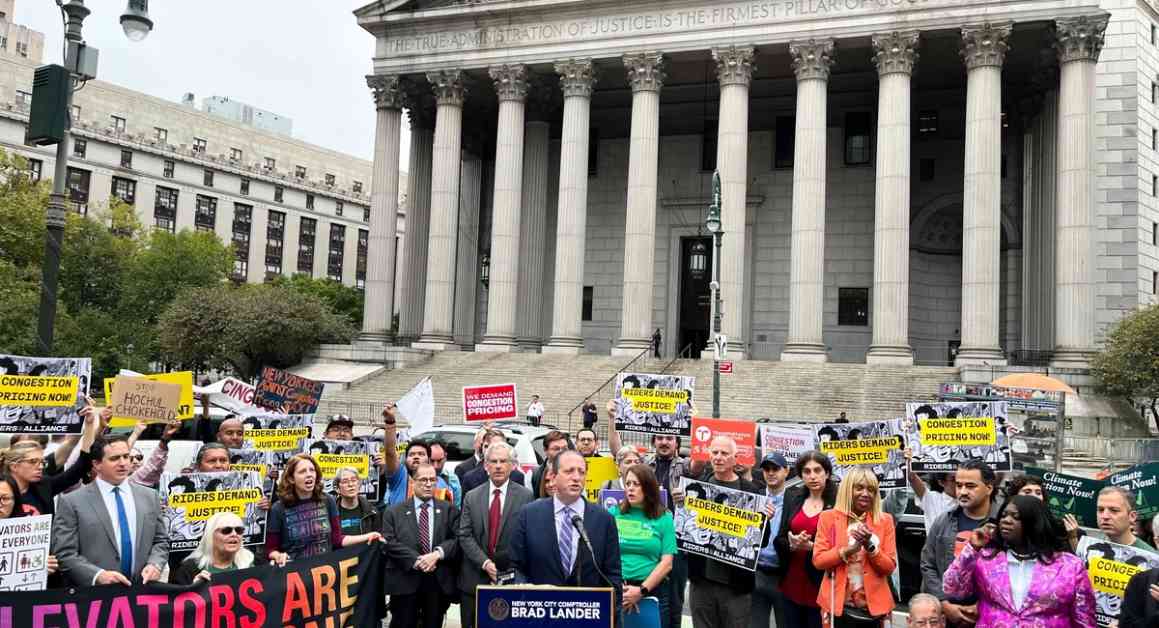Judge Allows Lawsuits Against Congestion Pricing to Move Forward
In a recent development, a Manhattan judge has given the green light for lawsuits challenging New York Governor Kathy Hochul’s decision to pause congestion pricing to proceed. The judge, Arthur Engoron, expressed his frustration with the traffic congestion in Manhattan, making a witty remark about the need for action to address the issue. Engoron is presiding over two lawsuits filed by a coalition of groups seeking to compel Hochul to activate tolls for drivers traveling south of 60th Street.
The ruling by Judge Engoron allows the legal cases to move forward, although the slow pace of litigation may clash with the legislative calendar in Albany. Governor Hochul has indicated that she plans to unveil a new congestion pricing proposal around January, coinciding with the state Legislature’s return to session. During the oral arguments on Hochul’s motion to dismiss the lawsuits, Judge Engoron raised questions about the governor’s authority to halt the congestion pricing plan, questioning whether it was a “backdoor veto” of the program.
One of the lawsuits challenging Hochul’s decision was filed by the City Club of New York and two residents of Hell’s Kitchen. Their argument revolves around the assertion that Hochul violated the 2019 law and exceeded her authority in pausing the congestion pricing program. Attorney Andrew Celli, representing the City Club of New York, emphasized the importance of keeping the Triborough Bridge and Tunnel Authority in charge of congestion pricing to prevent political interference in what should be a legal and technological matter.
Legal Battles and Environmental Concerns
The Sierra Club, the New York City Environmental Justice Alliance, and Riders Alliance filed the other lawsuit, focusing on a 2021 constitutional amendment guaranteeing New Yorkers the right to clean air, water, and a healthful environment. Hochul’s last-minute decision to pause the congestion tolls had significant repercussions, leading to the cancellation of over $16 billion in planned Metropolitan Transportation Authority (MTA) projects. These projects included improvements to station accessibility, signal upgrades on multiple subway lines, and investments in new subway cars and buses.
While the MTA recently approved its next five-year capital plan, the absence of funding from congestion pricing remains a pressing issue. The missing billions from congestion pricing pose a challenge for the MTA, as Hochul and state lawmakers must find alternative revenue sources to finance the agency’s projects. The potential revenue loss from the delayed activation of congestion tolls has been estimated at $152 million as of June 30, highlighting the financial impact of the governor’s decision.
Implications for Transportation Infrastructure and Funding
The legal battles surrounding congestion pricing in New York City have broader implications for transportation infrastructure and funding in the state. The delay in implementing the toll system not only affects the MTA’s planned projects but also raises questions about the reliability of funding sources for essential transportation improvements. With the looming financial challenges faced by the MTA, stakeholders are eagerly awaiting a resolution to the congestion pricing dispute.
Governor Hochul’s commitment to presenting a new congestion pricing plan in January signals a potential shift in the state’s approach to addressing traffic congestion and funding transportation projects. However, the legal hurdles and conflicting interpretations of the 2019 law underscore the complexity of implementing congestion pricing in a city as densely populated as New York. As the lawsuits progress through the judicial system, the outcomes will have far-reaching consequences for urban transportation policy and infrastructure development.
In conclusion, the legal battles over congestion pricing in New York City highlight the challenges of balancing transportation funding, environmental concerns, and political considerations. The lawsuits brought against Governor Hochul’s decision to pause the toll system reflect the broader debate surrounding urban congestion and transportation policy. As stakeholders await resolution in the courts, the future of congestion pricing in New York City hangs in the balance, with implications for transportation infrastructure, funding priorities, and environmental sustainability.

